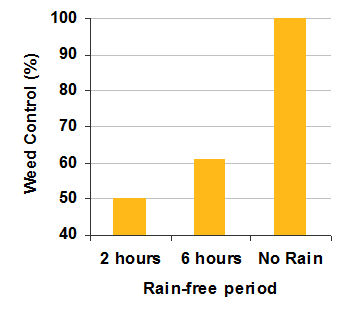 Paraquat controls weeds effectively even if it rains within 15 to 30 minutes of spraying. This excellent rainfastness is unique amongst herbicides and gives farmers important practical benefits. More work can be achieved in between showers and weed control will be better than when using alternative herbicides such as glyphosate or glufosinate and surprised by unpredicted rainfall.
Paraquat controls weeds effectively even if it rains within 15 to 30 minutes of spraying. This excellent rainfastness is unique amongst herbicides and gives farmers important practical benefits. More work can be achieved in between showers and weed control will be better than when using alternative herbicides such as glyphosate or glufosinate and surprised by unpredicted rainfall.
Paraquat’s rainfastness was immediately obvious from its early development in the 1960s in the plantations of South-East Asia.1 In tropical rainy seasons, as elsewhere, sudden rain can wash recently applied foliar-acting herbicides from weed leaves reducing or eliminating their efficacy.
Experimental evidence
Field experiments in Malaysia have shown the great advantages of paraquat’s incredible rainfastness.2 Long-term weather data indicate that there is a 50% chance of any day’s weed control operations being adversely affected by rain. This can be expensive in terms of extra herbicide and labor needed for re-spraying. In addition, continued weed growth and crop competition in the period before any re-spraying, should it prove necessary, is obviously undesirable. Using simulated rain, paraquat was found to be rainfast within 15 minutes of application, ie no difference could be measured between the degrees of weed control with or without wash-off. Clearly, sufficient paraquat must have been absorbed within that short time for maximum efficacy. However, glyphosate and glufosinate gave poor weed control even when the rain-free period was six hours.
An experiment conducted in a sophisticated rain simulator confirmed the rainfastness of the paraquat-based product SPRAY.SEED™ over glyphosate.3 After spraying, annual ryegrass (Lolium rigidum) was subjected to light rain of 2-3 mm/hour for 30 minutes after various rain-free periods. SPRAY.SEED™ was clearly rainfast after only 15 minutes, while glyphosate gave poor control even after 6 hours without rain. Results are shown in Fig.1.
 Glyphosate (730 g salt/ha)
Glyphosate (730 g salt/ha)
 SPRAY.SEED™ (250 g paraquat/ha)
SPRAY.SEED™ (250 g paraquat/ha)
Figure 1. Rainfastness of paraquat (left) and glyphosate (right) products on annual ryegrass (Syngenta, 2002).
Practical experience
Rain events can be quite complex: rain-free period after spraying, rainfall intensity and duration are the main features that will affect herbicide run-off from target weeds. A short, sharp shower could have similar effects to a longer period of steady rain. Very light rain can even help by redistributing spray deposits over leaves and stems. Weed characteristics are important too. Leaves are covered in waxes, some forms of which repel water more than others. Those that allow droplets to spread, facilitate faster herbicide penetration due to the greater contact area. However, weed populations are usually a mixture of species with various leaf-types and rainfall events all vary. Typically, over paraquat’s many decades of use, a good guide has been found to be that a rain-free period of less than half an hour is sufficient to achieve maximum levels of weed control.4
Not only is paraquat absorbed into weeds very quickly, but it is very fast acting. This allows any decisions on re-spraying to be made probably within a day of any problems. With slow acting glyphosate, the likely level of control would not be obvious for several days or even a few weeks depending on temperature.
References
- Jeater, R S L (1964). Evaluation of paraquat and diquat for weed control in rubber. Weed Research, 4, (2), 133 – 141
- Lim, J L & Ngim, J (1997). Evaluating non-selective herbicides for rainfast properties in Malaysia. The Planter, Feb 1997
- Syngenta Australia technical bulletin (2002)
- Bromilow, R H (2004). Paraquat and sustainable agriculture. Pest Management Science, 60, 340 – 34
Notes
The brand name of the leading paraquat product is GRAMOXONE®. SPRAY.SEED™ branded products contain a mixture of paraquat and diquat. GRAMOXONE® is a Registered Trademark of a Syngenta Group Company. SPRAY.SEED™ is a Trademark of a Syngenta Group Company.

